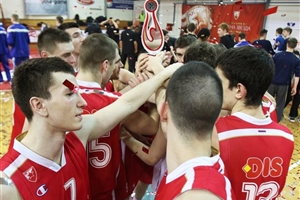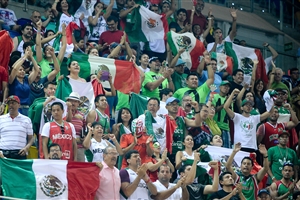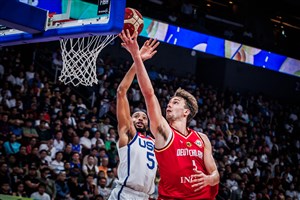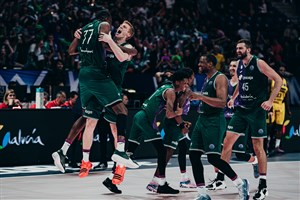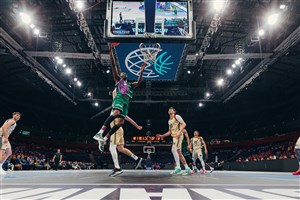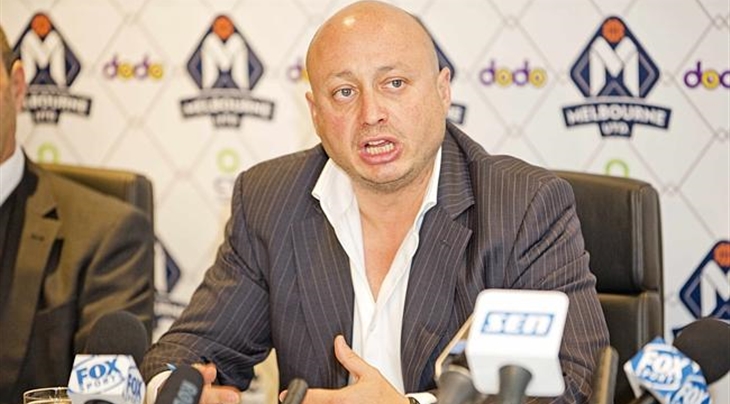
Vision at last?
MELBOURNE (Paulo Kennedy’s View from Downunder) - If the likes of Roy Ward and Boti Nagy are on the mark – and they're usually not too far off – Melbourne United owner Larry Kestelman is inching closer to becoming an even bigger player in NBL circles.
Kestelman reportedly made a strong bid for league ownership last year, and after what can only be described as a disastrous few months for the NBL, his LK Group is making another push.
Whether he will become the majority owner or a major sponsor with substantial influence remains to be seen, but if this is done right it will be exciting for basketball fans.
Why? Not because Kestelman has all the answers. The public has only seen titbits of his proposal, meaning it is far too early to make judgement.
Kestelman also oversaw an incredibly poor attempt at change management in Melbourne, alienating countless Melbourne Tigers supporters in the process.
So a cautious approach needs to be taken when it comes to predicting what a Kestelman takeover would deliver.
Regardless, it is an exciting time for the league and its fans, simply because there at last may be some vision driving what is done at HQ.
There was a feeling of excitement two years ago when club owners took back control of the league from Basketball Australia.
While it was no doubt a rushed move, the owners consolidated quickly by reducing operating costs and then got good people involved to grow the competition.
Tony Cochrane - renowned for boosting V8 Supercars into the Australian mainstream, Fraser Neill - well-credentialed after establishing the international Rugby 7s and Super Rugby in New Zealand, and Graeme Watson - who played a significant role in setting up the GWS Giants and West Sydney Wanderers, all came on board.
Cochrane’s aim was to make the NBL a more TV and casual-viewer friendly spectacle, hence opening up new opportunities to generate revenue.
Sadly, the one significant move in that direction – cracking down on physical play through tighter refereeing – lasted just one season.
Obviously Neill and Watson were expansion specialists. The vision was to attract new franchises and create a diversified product for TV and local communities, hence exposing new markets and new niches in existing markets to the NBL.
Less than a year in funding for Watson’s involvement was withdrawn and Neill was told to focus more on the sustainability of existing clubs.
Not surprisingly – shortly after a government-backed expansion bid he had worked closely with was told it didn’t fit the NBL Board’s ‘vision’ - Neill resigned.
Then we had the absurd situation of an NBL Board member stating publicly the league was sick of loaning money to struggling clubs, some nine months after Neill had been instructed to focus on their sustainability.
Quite frankly, since the owners regained control of the league, the NBL has been a child with an attention deficit, chasing after what takes its fancy, often dependent on what the loudest voice in the room is advocating.
So now I hope you can see why Kestelman’s proposal is exciting.
Reports suggest the initial period lasts for three years, meaning (hopefully) we will see a concerted effort to head in one clear direction during that time.
The first step appears to be Kestelman investing money in league HQ to create a professional operation.
When a member of the NBL executive rang me shortly after the owners had retaken control seeking input, the first thing I said was to ensure there was a quantity of quality people to make the league tick.
If Kestelman makes this happen it will mean the NBL’s interface with the media, public and business community will be far more professional, and it should take significant pressure off clubs who have simply been left to sink or swim.
But more than just combined marketing, media, membership and sponsorship, NBL clubs need strategic investment, networking and advocacy to help key areas that can lead to sustainable growth.
Adelaide – the 36ers live in a basketball town but haven't been able to capitalise. If the NBL can fund expertise on how to link with basketball culture, the broader community and how to link with key public figures who can rally troops to the cause, this franchise can make significant gains quickly.
Cairns – have been a model community franchise, and have been working towards creating tourism and business links for their club and town with New Zealand and China. If the NBL can help expedite these endeavours the Taipans could become an even better example for regional clubs.
Melbourne - Kestelman’s own team has been trying to connect with Melbourne’s enormous grassroots basketball scene, but so far the theory has been better than the practice. United’s next step should be involving local associations in the sale of NBL tickets, memberships and merchandise so it becomes a repeat revenue generator for both organisations.
New Zealand – the Breakers do so much right, but they haven't quite been able to fully crack the corporate market in Auckland. Luring some well-positioned allies to open more doors could be an important step towards greater sustainability
Perth – while the Wildcats have been flying in recent years, there is every chance their high expenditure, high cost model will come under pressure if the Western Australian economy declines further. Helping the Wildcats push into Asia will not only allow them to secure some additional revenue sources, but could certainly have flow-on effects for other clubs
Sydney– haven't been able to strongly link with the basketball community in the Harbour City despite some well-intentioned efforts. Following a similar model to what I have proposed for Melbourne – allowing local associations to generate funds from promoting the Kings – would be worth the relatively small investment
Townsville– have lost trust amongst their local community over the years, something that is crucial in a small market. If the NBL could invest in employing local people who can rebuild those bridges using the Cairns Taipans’ model, it’s possible the Crocs can get back to something resembling their glory days.
Wollongong– have struggled to capture public attention since Mat Campbell and Glen Saville retired, and their existence is still in doubt as a result. Perhaps the most important investment would be securing a sustainable stadium that caters for the Hawks’ modest crowds in a professional setting, be that an expanded Snakepit, a partnership with the local university or somewhere else.
Paulo Kennedy
FIBA
FIBA's columnists write on a wide range of topics relating to basketball that are of interest to them. The opinions they express are their own and in no way reflect those of FIBA.
FIBA takes no responsibility and gives no guarantees, warranties or representations, implied or otherwise, for the content or accuracy of the content and opinion expressed in the above article.

